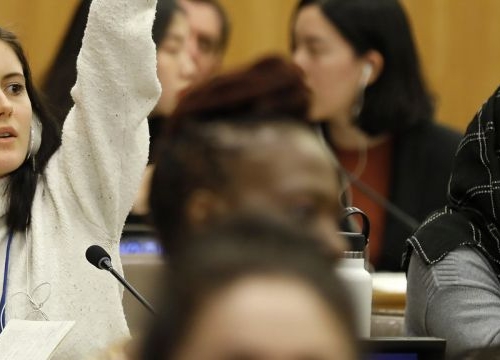Child Participation in the Work of UN Human Rights Mechanisms
Human Rights Conversations


UN Women/Ryan Brown
Children may engage in the work of United Nations (UN) human rights mechanisms in a variety of ways – largely through consultative, collaborative or child-led approaches - both at the international and national levels.
The UN Committee on the Rights of the Child (CRC) is the only UN mechanism that has developed working methods to support children’s participation as it regularly includes children in its day-to-day work, including throughout CRC sessions as well as during CRC Days of General Discussion.
Over the last decade, there has been a gradual increase of opportunities for child participation across the UN system, notably through ongoing advocacy from civil society and other national actors, including ombudspersons for children. Such spaces today include the UN Human Rights Council annual day on the rights of the child, UPR pre-sessions, the UN General Assembly (UNGA) high-level weeks, UNGA Third Committee discussions and, more broadly, the High-Level Political Forum on Sustainable Development and the UN Security Council. Furthermore, online modalities have significantly increased possibilities for children to contribute directly to such meetings.
The upcoming UN Guidance Note on Child Mainstreaming (2023) and the multi-stakeholder process leading to its adoption – including UN agencies, civil society and children – regards child participation as an essential element of the child rights approach that needs to be mainstreamed across the UN.
How to move beyond the current ad-hoc approach to child participation in the work of UN human rights mechanisms? What strategies can be adopted to institutionalise child participation in such processes, moving away from today’s reliance on individual organizations or UN representatives’ initiatives? What are the expectations and barriers encountered by children in accessing the UN human rights system? Finally, what is the outlook on ensuring a coherent UN-wide policy framework on child participation?
This Human Rights Conversation – co-organized with Child Rights Connect – will focus on responding to the above questions, through a panel inclusive of national and international experts as well as children and youth representatives engaged in UN human rights monitoring and reporting.
Moderator
- Domenico Zipoli, Research Fellow and Project Coordinator, Geneva Human Rights Platform
Panelists
- Bragi Gudbrandsson, Member, UN Committee on the Rights of the Child
- Ilaria Paolazzi, Deputy Director, Child Rights Connect
- Bruce Adamson, Children and Young People's Commissioner of Scotland
- Children/youth representatives (Scotland and Sierra Leone)
About Human Rights Conversations
Human Rights Conversations are a series of events, hosted by the Geneva Human Rights Platform, aimed at discussing contemporary issues and challenges related to the promotion and protection of human rights in Geneva and beyond.
Video
Human Rights Conversation: Child Participation in the work of UN Human Rights Mechanisms
This Human Rights Conversation – co-organized with Child Rights Connect, discussed child participation in the work of UN human rights mechanisms and opportunities to move away from today’s reliance on individual organizations or UN representatives’ initiatives.








